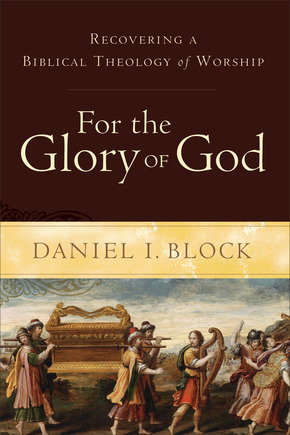Block, Daniel I. For the Glory of God: Recovering a Biblical Theology of Worship. Grand Rapids, Mich.: Baker Academic, 2014. 432 pages. Hardcover. Retail: $34.99.
In the spring semester of 2011, I had the privilege of attending a course at Wheaton College, IL that Dr. Daniel Block taught based upon the content that would become his new book, For the Glory of God: Recovering a Biblical Theology of Worship. It is a joy to now see the publication of this material, which provides a biblical-theological overview of one of the most central—and far too-often misunderstood—aspects of Christian life: worship. Block’s aim is to present and understand the way in which worship is described throughout the Bible and then to reflect on how the biblical description of worship can and should inform the way churches and individuals understand the essence of Christian worship.
In an ecclesial culture that is divided on the issue of what constitutes “worship,” Block suggests that the picture of biblical worship extends far beyond a weekly session of a specific type of music. Rather, “True worship involves reverential human acts of submission and homage before the divine Sovereign in response to his gracious revelation of himself and in accord with his will” (p. 23). This definition of worship recurs throughout the entire book, acting as a refrain to continually remind the reader that worship is God-centered and inclusive of every aspect of Christian life, both individual and corporate.
Perhaps surprisingly to some readers for a work with implications for the contemporary church, Block makes his case in appeal primarily to the “First Testament,” Block’s preferred term with reference to Hebrews 9:15 for what is more commonly known as the Old Testament. For all its many benefits, perhaps the greatest accomplishment of Block’s work here and elsewhere is the insistence that God’s revelation in the First Testament provides a true and continuing representation of the God who was fully revealed in Jesus Christ.
Block’s perspective on the First Testament is well demonstrated in his discussion of the holiness codes found in Leviticus 17-26, a section which can sometimes be unfortunately caricatured as a list of pedantic rules for an arbitrary cultic purity within ancient Israel. Block rather contends that the theme of this section is “the grace of YHWH expressed in revelation of what it means to be his holy temple” (p. 90). He further proceeds to note, “Rather than functioning as a legal or cultic code, this collection of commands creates a picture of worship that arises out of a particular vision of God and out of gratitude for his incredible grace” (p. 92). Indeed, this is an impassioned study by a zealous defender of the First Testament, urging modern Christians not to ignore God’s gracious self-revelation within the books recounting Israel’s covenant relationship.
For the Glory of God is organized into thirteen chapters that each look at a different aspect of the biblical presentation of worship. It begins with a general study of the Hebrew and Greek words that the Bible uses when speaking about worship before moving onto chapters that examine the biblical object and subject of worship—that is, who receives and who gives worship in the biblical accounts.
The next two chapters, which for me constituted the most significant contributions of the book, detail how the bible presents daily life, including family life and work, as the primary realm of Christian worship. In keeping with the aforementioned definition of worship, Block contends, “True worship is expressed primarily in everyday conduct” (p. 81 – emphasis original).
The next chapters shift to explore areas that are more commonly associated with Christian worship including the ordinances, the reading of scripture, prayer, music, and sacrifice and offering. It is broadly indicative of Block’s emphasis on daily life as the appropriate arena for worship that the first discussion of music’s role in worship does not occur until 220 pages in. The final three chapters look at how worship invites Christians into the drama of God’s redemption, how sacred space functions in worship, and finally, how leaders serve within worship.
One of the difficulties of a “biblical theology” is the broad amount of data that must be included. Block does a good job of attempting to demonstrate the primary scriptures in the main text while also providing other relevant texts in the footnotes, resulting in a treasure trove of biblical data in the footnotes. Indeed, there is no lack of exegetical data. A significant amount of attention is paid to word and concept studies. The book is also full of helpful graphs, charts, and other graphics that illustrate aspects of Block’s exposition. These have been obviously honed from years of classroom use to effectively aid in communication.
Each chapter takes a similar structure: biblical data is presented moving from First Testament to New Testament, then the data is analyzed and synthesized, and finally suggestions are made for understanding worship in the current church setting. The chief aim of Block’s book, which he achieves with great success, is to push Christians to intentionally reflect on the biblical data in order to inform church practice so that Christian worship practices may be truly biblically rather than culturally based.
The Bottom Line: For the Glory of God is a terrific presentation and synthesis of the biblical account of what constitutes worship that will stimulate thought and discussion for individuals and churches seeking to be biblical in their approach to worship.
Review by Eric Covington (ec82@st-andrews.ac.uk)
University of St Andrews





1 Comment
Leave your reply.